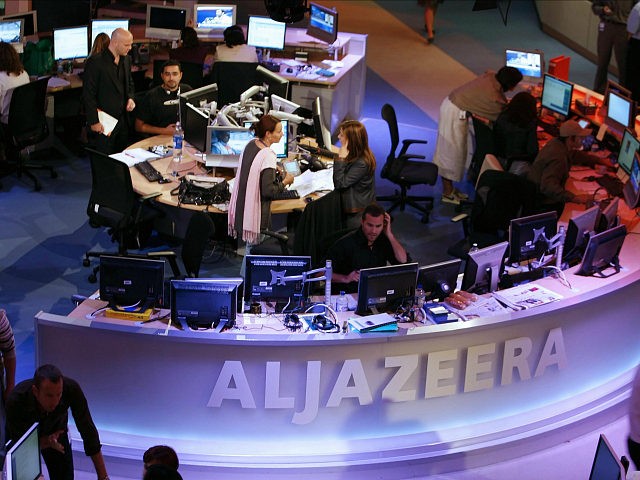The Al-Jazeera news network, based in Qatar’s capital Doha and funded by the Qatari government, has not merely suffered collateral damage from the Gulf diplomatic crisis but has been cited as a key element of it.
On Thursday, the network reported “systematic and continual hacking attempts” against its servers.
Qatari officials told CBS News that the country’s state-run television station was also under cyberattack, although precise details of the intrusion were not provided. Qatar blames hackers for planting false news stories on its media websites that touched off the growing dispute between the emirate and other Sunni Arab nations.
Al-Jazeera’s broadcast licenses in Saudi Arabia, the United Arab Emirates, and Jordan have been revoked, and the network says it has been “removed from subscription bundles in a number of distribution platforms in Middle East and a few Arab countries.” Another nation participating in the boycott of Qatar, Egypt, closed Al-Jazeera facilities and blocked its website some time ago.
Al-Jazeera denounced these measures as politically-motivated censorship, as did international watchdog group Reporters Without Borders.
“Closing Al-Jazeera’s bureau is a political decision that amounts to censoring this TV broadcaster. In Saudi Arabia, this violation of the freedom to inform compounds the country’s already very bad record on free speech and media freedom, We urge the Saudi authorities to rescind this decision and to let Al Jazeera resume operating,” said Reporters Without Borders Middle East director Alexandra El Khazen.
“We firmly believe these are unjustified measures by the authorities in the Kingdom against the Network and its operations,” Al-Jazeera representatives told Reporters Without Borders. “We call upon the government to respect the freedom of press and allow journalists to continue do their job free of intimidation and threats.”
As Al-Jazeera points out, permanently shuttering the news network is one of the demands made of Qatar by Saudi Arabia, Egypt, the UAE, and the other countries aligned against it.
These countries accuse Al-Jazeera of supporting terrorist groups. The Egyptian government of President Abdel Fattah el-Sisi is particularly incensed at Al-Jazeera’s support for the Muslim Brotherhood, which took control of Egypt after the fall of President Hosni Mubarak during the Arab Spring. In 2013, 22 members of Al-Jazeera’s staff in Egypt resigned over coverage biased in favor of the Brotherhood, accusing their own network of “airing lies and misleading viewers.”
“The management in Doha provokes sedition among the Egyptian people and has an agenda against Egypt and other Arab countries,” one of Al-Jazeera’s Egyptian anchors complained. He said upper management gave the Egyptian staff specific instructions to “telecast certain news” favorable to the Muslim Brotherhood or damaging to the Sisi government.
The Washington Post notes that criticism of Al-Jazeera has not been confined to the Middle East: “Some Americans have accused it of being a mouthpiece for terrorist organizations because of what they considered slanted coverage of the 9/11 attacks in the U.S. and its broadcasts in the aftermath of those attacks of numerous statements by Osama bin Laden. The George W. Bush administration lambasted Al-Jazeera for promoting anti-U. S. propaganda.”
The Post cites some analysts more favorable to Al-Jazeera who point to its enormous following and challenges to authoritarian regimes, portraying it as too valuable to sacrifice despite its flaws. Some of these more optimistic voices suggest the network might be able to survive the current crisis by adjusting its editorial policies and perhaps running a bit less critical coverage of Saudi Arabia.
Newsweek notes that Al-Jazeera figured prominently in a list of complaints presented to the Qatari government at the Gulf Leaders Summit in 2014 — a list that Saudi Arabia, Bahrain, and the UAE clearly feel Qatar has not addressed properly.
“It is likely that this time the Gulf States will demand the complete shuttering of the Al Jazeera TV Network before any mediation can take place. Additionally, the plug will have to be pulled on networks funded by Qatar such as Al Araby Al Jadeed (The New Arab), originally set up to compete with Al Jazeera and headed by former politician and Palestinian citizen of Israel Azmi Bishara,” Newsweek speculates.
The article goes on to list other media outlets with Qatari backing that will likely feel some heat as the diplomatic crisis grinds on and also names some Muslim Brotherhood figures who will probably have to be expelled from Qatar.

COMMENTS
Please let us know if you're having issues with commenting.